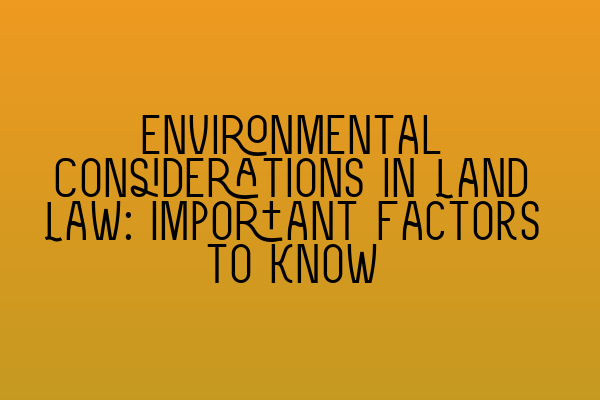Environmental Considerations in Land Law: Important Factors to Know
In today’s world, where environmental concerns are becoming more prevalent, it is crucial for property law practitioners to be knowledgeable about the environmental considerations that can arise when dealing with land transactions. This blog post aims to shed light on important factors related to environmental aspects in land law, providing you with a comprehensive understanding of their significance.
1. Environmental Assessments and Surveys
When dealing with land transactions, it is essential to conduct thorough environmental assessments and surveys. These assessments help identify potential environmental risks and liabilities associated with the land. From contaminated sites to potential hazardous materials, environmental surveys can unveil crucial information that can impact land usage, planning permissions, and property values.
2. Contaminated Land
Contaminated land refers to land that has been polluted due to historical or ongoing activities, such as industrial operations or waste disposal. It is important to assess the extent of contamination and understand your responsibilities and potential liabilities as a landowner or buyer. Environmental consultants can help evaluate the contamination and provide guidance on remediation measures required to mitigate risks.
3. Environmental Due Diligence
Environmental due diligence is a critical step in land transactions. It involves investigating the environmental history and liabilities related to a property. By conducting thorough due diligence, you can uncover potential environmental risks, such as underground storage tanks, pollutants, or sensitive habitats. This information will help you make informed decisions and negotiate appropriate terms and conditions in contracts.
4. Planning Permissions and Environmental Impact Assessments
During the planning process, it is crucial to consider the potential environmental impact of a proposed development or construction project. Environmental Impact Assessments (EIAs) evaluate the implications of a project on the surrounding environment. Understanding the legal requirements and regulations governing this aspect is essential for obtaining planning permissions and ensuring compliance.
5. Conservation Areas and Listed Buildings
Conservation areas and listed buildings play a vital role in preserving our cultural and natural heritage. When dealing with transactions involving these protected sites, it is crucial to understand the legal restrictions and obligations associated with them. Consulting with experts who specialize in heritage and conservation law is advisable to navigate these complexities effectively.
6. Renewable Energy Considerations
With the growing focus on sustainability and renewable energy sources, incorporating renewable energy options into land developments has become increasingly important. PV solar panels, wind turbines, and hydroelectric power are just a few examples of green energy solutions that can be integrated into land projects. Understanding the relevant legislation, incentives, and potential financial benefits associated with renewable energy installations is crucial for landowners and developers.
7. Mitigating Climate Change Risks
Climate change is a global concern that affects the way we live, and it has implications for land law as well. Coastal erosion, flooding, and other natural disasters associated with climate change can impact land values and usage. It is essential to consider these risks and take appropriate measures to mitigate them, such as incorporating flood-resistant design elements or implementing sustainable drainage systems.
8. Environmental Liability and Indemnities
Environmental liabilities can have significant financial and legal implications. Understanding who is responsible for existing pollution or contamination, and the allocation of liability in contracts, is crucial in land transactions. It is common practice to include indemnity provisions to protect parties from unforeseen environmental liabilities that may arise in the future.
In conclusion, environmental considerations are an integral part of land law, and being aware of these factors is crucial for property law practitioners. Conducting thorough environmental assessments, understanding contamination risks, and ensuring compliance with planning and conservation regulations are essential steps in any land transaction. Furthermore, incorporating renewable energy options and mitigating climate change risks can enhance the value and sustainability of land developments. By staying informed and seeking expert advice, practitioners can navigate the complexities of environmental considerations effectively and ensure a sustainable future for land transactions.
Related Articles:
– SQE 1 Practice Exam Questions
– SQE 1 Practice Mocks FLK1 FLK2
– SQE 2 Preparation Courses
– SQE 1 Preparation Courses
– SRA SQE Exam Dates
